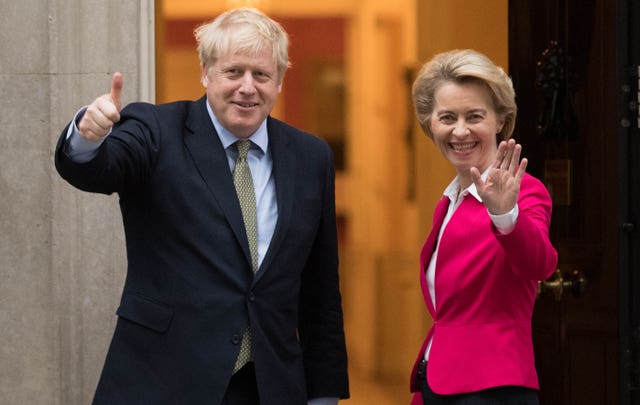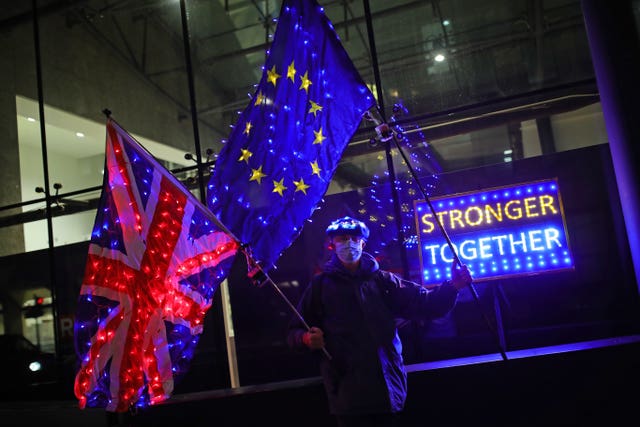Post-Brexit trade talks resume in Johnson’s ‘final throw of the dice’
Chief negotiators Michel Barnier and Lord Frost return to the talks table in a final push for an agreement.

British and EU negotiators will resume talks in Brussels in a “final throw of the dice” as they try to secure a post-Brexit trade deal.
With time rapidly running out before the Brexit transition period concludes at the end of the month, Lord Frost and Michel Barnier will meet in a last-ditch attempt to resolve the remaining issues.
Their return to the negotiating table follows an hour-long call on Saturday between Boris Johnson and European Commission president Ursula von der Leyen, in which they agreed on a final push to get an agreement.
Ahead of the meeting however, British sources warned there was no guarantee they would succeed.
“This is the final throw of the dice,” said one UK source close to the negotiations.
“There is a fair deal to be done that works for both sides, but this will only happen if the EU is willing to respect the fundamental principles of sovereignty and control.”
In a joint statement following their call, Mr Johnson and Ms von der Leyen acknowledged “significant differences” remained on the key issues of fishing rights, competition rules and the governance arrangements for any deal.

“Both sides underlined that no agreement is feasible if these issues are not resolved,” they said.
“Whilst recognising the seriousness of these differences, we agreed that a further effort should be undertaken by our negotiating teams to assess whether they can be resolved.
“We are therefore instructing our chief negotiators to reconvene tomorrow in Brussels. We will speak again on Monday evening.”
The call took place after Mr Barnier and Lord Frost announced on Friday that they were putting the talks on “pause” after the latest round of negotiations failed to achieve breakthrough.
Lord Frost is now travelling back to Brussels with a small team of negotiators to attempt to work through the remaining issues.
While in the past much of the focus has been on the differences over fisheries, British sources indicated they would be looking particularly at the so-called “level playing field” rules on issues like state aid for business.
While the two sides have been circling round the key issues for months, it was is unclear from the statement whether either – or both – of the two leaders had been prepared to shift ground in a way that would enable them to bridge the gaps.
On the UK side there was continuing anger at what were being described as the EU’s “unprecedented and last-minute demands” which, it was said, would have tied Britain to EU regulations “in perpetuity”.
There were accusations that the EU was pursuing an “unrealistic” negotiating mandate and that the talks had got as far as they could without high level political intervention.
For Labour, shadow cabinet office minister Rachel Reeves called on both sides to resolve their differences as swiftly as possible.
“The British people were promised a deal and, with time running out, we urge both sides to get on with reaching an agreement,” she said.
However, Brexit Party leader Nigel Farage expressed concern that they were moving towards yet another extension of Britain’s period under EU rules.
“I do hope that this lack of an agreement does not mean we are heading for an extension,” he tweeted.
“After four and a half years, Brexit voters won’t tolerate that.”
Speaking on BBC Breakfast on Sunday, Theresa May’s former chief of staff Lord Gavin Barwell said he believes a deal on a post-Brexit trade agreement is “definitely still possible”, although it will rely on whether or not both sides are “prepared to make the compromises necessary”.
If there is no agreement, the UK will leave the European single market and customs union on December 31 and begin trading with the bloc on World Trade Organisation terms, with the imposition of tariffs and quotas.
EU leaders are due to meet on Thursday for a two-day summit in Brussels – their last scheduled gathering of the year – when they could sign-off on any agreement.

Time then has to be found for both Houses of Parliament in the UK and the European parliament to ratify it before the transition period expires – although there have been suggestions that could slip in the EU side.
In a further complicating factor, the UK Government is bringing back to the Commons legislation enabling it to override elements of Mr Johnson’s “divorce” settlement with Brussels in breach of international law.
On Monday, MPs will vote on whether to overturn amendments by the House of Lords which removed the provisions in the UK Internal Market Bill relating to the Irish border.
MPs will then go on later in the week to consider the Taxation (Post-Transition Period) Bill which contains further similar provisions.
The legislation has infuriated the EU and – if it is passed – could further sour the mood in the negotiations making a deal harder to reach.





